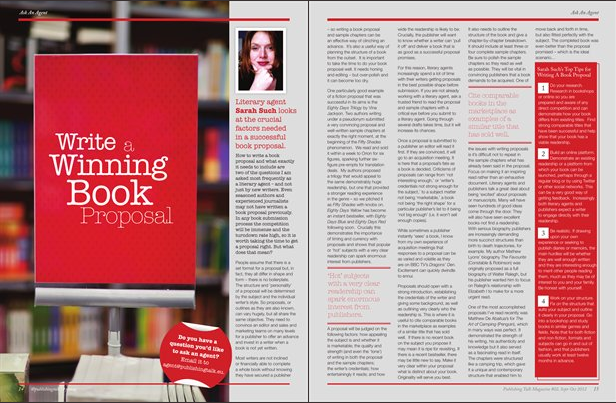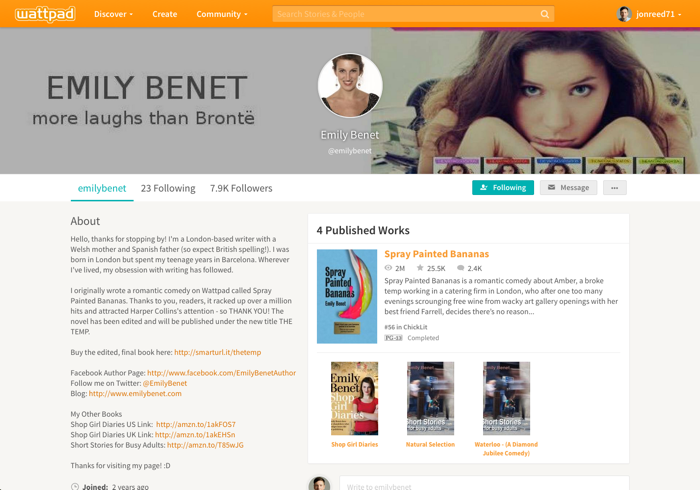How to write a winning book proposal

Literary agent Sarah Such looks at the crucial factors needed in a successful book proposal.
How do you write a book proposal? And what, exactly, does it needs to include? These are two of the questions I am asked most frequently as a literary agent. And not just by new writers. Even seasoned authors and experienced journalists may not have written a book proposal previously. In any book submission process the competition will be immense and the turndown rate high. It’s therefore worth taking the time to get a proposal right. But what does that mean?
People assume that there is a set format for a proposal. In fact, they all differ in shape and form – there is no boilerplate. The structure and ‘personality’ of a proposal will be determined by the subject and the individual writer’s style. So proposals, or outlines as they are also known, can vary hugely, but all share the same objective. They need to convince an editor and sales and marketing teams on many levels for a publisher to offer an advance and invest in a writer when a book is not yet written.
Most writers are not inclined or financially able to complete a whole book without knowing they’ve secured a publisher. So writing a book proposal and sample chapters can be an effective way of clinching an advance. It’s also a useful way of planning the structure of a book from the outset. It’s important to take the time to do your book proposal well. It needs honing and editing – but over-polish and it can become too dry.
One particularly good example of a fiction proposal that was successful in its aims is the Eighty Days Trilogy by Vina Jackson. Two authors writing under a pseudonym submitted a very convincing proposal and well-written sample chapters at exactly the right moment, at the beginning of the Fifty Shades phenomenon. We read and sold it within a week to Orion for six figures, sparking further six-figure pre-empts for translation deals.
My authors proposed a trilogy that would appeal to the same demonstrably huge readership, but one that provided a stronger reading experience in the genre – so we pitched it as Fifty Shades with knobs on. Eighty Days Yellow has become an instant bestseller, with Eighty Days Blue and Eighty Days Red following. This demonstrates the importance of timing and currency with proposals. It shows that popular or ‘hot’ subjects with a very clear readership can spark enormous interest from publishers.
What are publishers looking for in a book proposal?
A proposal will be judged on the following factors:
- how appealing the subject is and whether it is marketable
- the quality and strength (and even the ‘tone’) of writing in both the proposal and the sample chapters
- the writer’s credentials
- how entertainingly it reads
- how wide the readership is likely to be.
Crucially, the publisher will want to know whether a writer can ‘pull it off’ and deliver a book that is as good as a successful proposal promises.
For this reason, literary agents increasingly spend a lot of time with their writers getting proposals in the best possible shape before submission. If you are not already working with a literary agent, ask a trusted friend to read the proposal and sample chapters with a critical eye before you submit to a literary agent. Going through several drafts takes time, but it will increase its chances.
Once a proposal is submitted to a publisher an editor will read it first. If they are convinced, it will go to an acquisition meeting. It is here that a proposal’s fate as a book is decided. Criticisms of proposals can range from ‘not interesting enough,’ or ‘writer’s credentials not strong enough for the subject,’ to a subject matter not being ‘marketable,’ a book not being ‘the right shape’ for a particular publisher’s list to it being ‘not big enough’ (i.e. it won’t sell enough copies).
While sometimes a publisher instantly ‘sees’ a book, I know from my own experience of acquisition meetings that responses to a proposal can be as varied and volatile as they are on BBC TV’s Dragons’ Den. Excitement can quickly dwindle to ennui.
What should a book proposal include?
Proposals should open with a strong introduction, establishing the credentials of the writer and giving some background, as well as outlining very clearly who the readership is. This is where it is useful to cite comparable books in the marketplace as examples of a similar title that has sold well. If there is no recent book on the subject you propose it may mean it is ripe for revisiting. If there is a recent bestseller, there may be little new to say. Make it very clear within your proposal what is distinct about your book. Originality will serve you best.
It also needs to outline the structure of the book and give a chapter-by-chapter breakdown. It should include at least three or four complete sample chapters. Be sure to polish the sample chapters so they read as well as possible. They will be vital in convincing publishers that a book demands to be acquired. One of the issues with writing proposals is it’s difficult not to repeat in the sample chapters what has already been said in the proposal. Focus on making it an inspiring read rather than an exhaustive document.
Literary agents and publishers talk a great deal about being ‘excited’ about proposals or manuscripts. Many will have seen hundreds of good ideas come through the door. They will also have seen excellent books not find a readership. With serious biography publishers are increasingly demanding more succinct structures than birth to death trajectories, for example. My author Mathew Lyons’ biography The Favourite (Constable & Robinson) was originally proposed as a full biography of Walter Ralegh, but his publisher wanted him to focus on Ralegh’s relationship with Elizabeth I to make for a more urgent read.
One of the most accomplished proposals I’ve read recently was Matthew De Abaitua’s for The Art of Camping (Penguin), which in many ways was perfect. It demonstrated the strength of his writing, his authenticity and knowledge but it also served as a fascinating read in itself. The chapters were structured like a camping trip, which gave it a unique and contemporary structure that enabled him to move back and forth in time, but also fitted perfectly with the subject. The completed book was even better than the proposal promised – which is the ideal scenario…
Sarah Such’s Top Tips for Writing A Book Proposal
- Do your research. Research in bookshops or online so you are prepared and aware of any direct competition and can demonstrate how your book differs from existing titles. Find strong comparable titles that have been successful and help show that your book has a viable readership.
- Build an online platform. Demonstrate an existing readership or a platform from which your book can be launched, perhaps through a regular blog or by using Twitter or other social networks. This can be a very good way of getting feedback. Increasingly both literary agents and publishers expect a writer to engage directly with their readership.
- Be realistic. If drawing upon your own experience or seeking to publish diaries or memoirs, the main hurdles will be whether they are well enough written and they are interesting enough to merit other people reading them, much as they may be of interest to you and your family. Be honest with yourself.
- Work on your structure. Fix on the structure that suits your subject and outline it clearly in your proposal. Go into a bookshop and study books in similar genres and fields. Note that for both fiction and non-fiction, formats and subjects can go in and out of fashion, and that publishers usually work at least twelve months in advance.
- Leave book jackets to the professionals. Tempting as it may be to ‘mock up’ a jacket to go with your proposal submission, don’t. It can be extremely off-putting for both agents and publishers.
This article first appeared in issue 2 of Publishing Talk Magazine.



I have been working towards finishing my 3 novel and my autobiargfe of which I’m think I may need advice with u see I wanted 24 years to write it because it could be dangerous to for many people if its connected back to me as the author this book will certainly be one all the u s will find a great read and it’s all based on true story
Pingback: HOW TO WRITE A WINNING BOOK PROPOSAL - Arte Fuse
Pingback: Book proposal | Making Book
A book proposal is such a useful tool – not only for agents and publishers to see if they’re interested, but for authors to know what they’re actually writing! Great post, thanks.